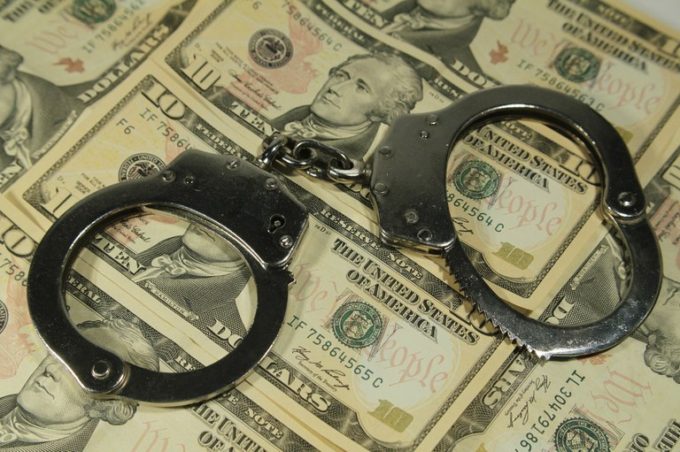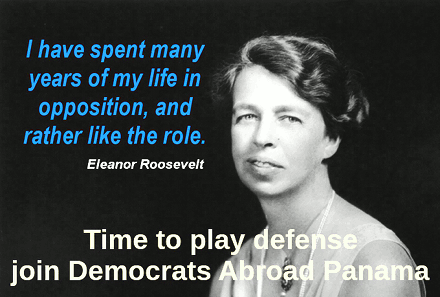
As Odebrecht collapses on many fronts, are it and its accomplices sealed off from consequences in Panama?
by Eric Jackson
The summit
Odebrecht is dominating the news across much of Latin America, but coverage blacked out in two of the places where the Brazilian-based company operated: Cuba and the United States. If one does not count money laundering jurisdictions, Odebrecht has operations, mostly construction but also petrochemicals and other businesses, in 26 countries. Top prosecutors from 15 of the jurisdictions, including Panama’s Attorney General Kenia Porcell, met in Brasilia on February 16 and 17 to share information and coordinate their investigations.
After the summit 11 of those who attended — Porcell and her counterparts in Argentina, Brazil, Chile, Colombia, the Dominican Republic, Ecuador, Mexico, Peru, Portugal and Venezuela — issued a declaration that they would establish “joint research teams, bilateral or multilateral, that allow coordinated research on the Odebrecht case” so that they could track down and recover assets. But the statement also acknowledged that each country has full autonomy and the extent of the cooperation was not made entirely clear. At least part of the vagueness was to be expected by the nature of an ongoing investigation and laws in several of the countries banning publicity in pending cases.
The scandal
The current series of Odebrecht scandals began to break as Brazil’s National Police embarked on “Operation Car Wash” — Lava Jato in Brazilian Portuguese — which was about bribery and kickbacks in the country’s Petrobras state-owned oil company. Information coming to light in raids and in questioning of suspects quickly involved Braskem, a chemical company partnership between Odebrecht and Petrobras, and corrupt Odebrecht contracts for offshore oil drilling rigs, tankers and oil and gas pipelines. It wasn’t long before CEO Marcelo Odebrecht was implicated and arrested — he’s now serving a sentence of more than 19 years, but talking to prosecutors in hopes of a reduction in that time. A plea bargain with Brazilian prosecutors likewise got the company to pledge full testimony and cooperation from 77 of its executives in exchange for reduced fines and no revocation the company’s corporate status.
What has come out are tales of systematic bribery in Odebrecht operations abroad, aimed at securing overpriced contracts with part of the proceeds kicked back to corrupt public officials. The company even had a dedicated bribe department, the “Structured Operations Section,” which handled complex money laundering transactions involving many jurisdictions, including Panama. Jürgen Mossack and Ramón Fonseca Mora, founders of the Mossack Fonseca law firm of Panama Papers notoriety, are now in a Panamanian jail awaiting trial for their firm’s alleged money laundering activities in Brazil.
There is a modus operandi in common with the various Odebrecht allegations that have come to light. There are more open payments made to politicians’ foundations and campaign committees — never publicized at the time, but generally a matter of public record somewhere. Then there are outright bribes, concealed through chains of shell companies and legitimate business, with the trail ending (or more likely being lost) with relatives of the public officials being bribed.
In the State of Florida, Odebrecht made a substantial donation to Jeb Bush’s foundation and later received large public works contracts from that state when Bush became governor. The donation was not made public until years later. Odebrecht also got major contracts with Miami-Dade County, and made donations to Miami Democratic party boss Xavier Suarez’s political action committee. In Brazil there were Odebrecht contributions to politicians of almost all factions across the partisan spectrum.
In Panama…
Here in Panama it is acknowledged that Odebrecht gave to multiple politicians’ campaigns, but the Electoral Tribunal is withholding the records of these, citing laws to protect Odebrecht’s privacy.
Did Juan Carlos Varela take money from Odebrecht, as the president’s now incarcerated erstwhile right-hand-man Ramón Fonseca alleges? So far there is no evidence for a direct contribution in the name of Odebrecht. But to the extent that Varela has released the records of the donations his campaign received, many are in the names of anonymous corporations, the principals of which and the provenance of the money donated cannot be readily traced. One donor company, an insurance company named Active Capital Holdings, saw some huge and unusual cash flows through it at the time of the 2014 election campaign and did have a business relationship with an Odebrecht front company called Sherkson. But so far the alleged record published in Ricardo Martinelli’s newspapers and La Prensa shows an Active Capital payment to Sherkson, rather than receipt of money from it. The principal of Active Capital is banker Juan Antonio Niño. Mr. Niño’s wife and one of the directors of Active Capital, Margarita de Niño, is the sister-in-law of President Varela’s brother, legislator José Luis Varela.
Attorney General Porcell is asking about the Active Capital connection, having been alerted a year ago by Swiss money laundering investigators’ letters rogatory. Martinelli’s El Panama America and La Critica are just a part step away from heralding what is known as proof that Varela took a bribe, but Mr. Niño and Mr. Varela deny any wrongdoing and the showing of various ties is not the same thing as proof of a causal relationship. Bribery is a very hard thing to prove — unless one of the parties to the transaction comes clean about it. The possibility of this happening from the Odebrecht end should not be discounted, but so far there is no public evidence of it.
Part of the information that is on the public record about the Odebrecht scandal derives from a plea bargain in a Foreign Corrupt Practices Act case that the US Department of Justice brought against Odebrecht and Braskem. Some $59 million in corrupt payments to Panamanian public officials are alleged in that case. The documents released suggest $4 million in bribes paid to former President Ricardo Martinelli via his two sons. But the attachments to those documents that contain the specific details of Odebrecht execs are being withheld from the public and the United States continues to harbor the Martinellis, fugitives from Panamanian and Swiss justice as they are. There can be various explanations of why this Martinellis continue to enjoy US protection.
Odebrecht’s economic implosion
When the Lava Jato scandal began to break in Brazil, Odebrecht had more than 128,000 people working for it. Now there are 75,000 to 80,000 and that number is rapidly shrinking. In Peru the government has seized some $61.5 million from eight companies implicated in Lava Jato, including Odebrecht and some probable Odebrecht fronts. Venezuela has frozen all of Odebrecht’s assets there. Three Colombian banks have taken the initiative to freeze Odebrecht assets in their country. Across the more than two dozen countries where the company does business, orders have been canceled, work has been halted and lines of credit have been withdrawn. Nowadays almost nobody wants to sign a new contract with Odebrecht and few banks want to be known for doing business with them.
In Panama Odebrecht, in a consortium with Spain’s FCC, got the contract for Line 2 of the Metro commuter train system in a controversial bidding process, and that work is underway. But its lines of credit, required under the contract with the government, were withdrawn. The suggestion that the state-owned Banco Nacional de Panama step in was not received and for several weeks Odebrecht continued work while failing to comply with the financing requirement. Now, however, it has been announced that two foreign banks have stepped in to provide the mandatory backing — but those financial institutions have not been identified. Odebrecht cites a confidentiality agreement and neither the Metro authority nor the Varela administration are objecting. Nor are any opposition politicians demanding the information. Now Panama has the precedent of private confidentiality agreements shielding the identity of those with whom the government does business from the public.
There are widespread expectations among anti-corruption protesters that Odebrecht will sign an agreement with Porcell, one of the effects of that being that the identities of those who took money from the company will remain secret. If that comes to pass the government may not fall — or it might — but there would be more political volatility and instability going into the next elections in a little more than two years’ time. Porcell is promising transparency and accountability, but at the moment she is in any case bound by laws that make the details of ongoing criminal investigations confidential.










